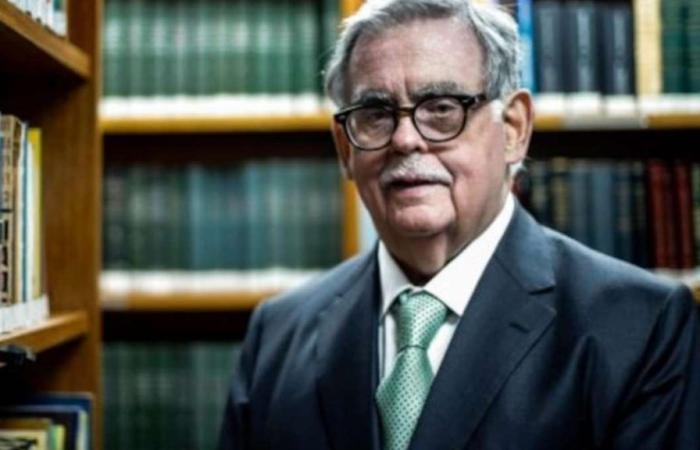Throughout his 53-year career, the lawyer Antonio Cláudio Mariz de Oliveira He took on cases of enormous political repercussion. He defended, for example, businessman Paulo César Farias, known as “PC Farias”, the center of the corruption scandal that led to the downfall of former president Fernando Collor. He also worked on Mensalãoa case that placed historical leaders of the Workers’ Party and allied parties at the center of a scheme to buy political support in Congress.
Almost a decade later, when the Operation Lava Jato once again shook the political class, the criminalist entered the field. He took on the defense of the vice president of Camargo Corrêa, Eduardo Hermelino Leitewho later signed a plea agreement with the Curitiba task force and admitted paying bribes to directors of the Petrobras.
Mariz was one of the first lawyers to speak out against the operation’s methods, a position he maintains to this day, ten years after the first obvious phase of the investigation arrested money changer Alberto Youssef. In an interview with EstadãoMariz states that Lava Jato fueled the idea that law “gets in the way”.
He assesses, however, that the exercise of the right to defense has worsened since the height of the operation. “With all the mistakes, problems and losses, today you have difficulties that you didn’t have back then.”
He cites, for example, virtual sessions, which do not allow oral arguments in real time, and the reduced time for arguments in the judgment of habeas corpus appeals. “If today they are not arresting left and right, if they are not carrying out coercive conduct, if today there is a custody hearing, which is a good thing, it is more difficult to exercise the defense.”
His vast experience in corruption cases makes him believe that, despite its unprecedented performance, Lava Jato did not correct the root of the problem. “The causes of corruption are ethical and they didn’t mess with it.”
The result of the operation, in the view of the long-lived lawyer, was to encourage punitive action. “Society began to cry out for jail.”
Criticism also extends to the current senator Sergio Moro (União Brasil-PR). As well as the Federal Supreme Court (STF)which declared the former judge suspect in the conduct of the processes involving the president Luiz Inácio Lula da Silva (PT), Mariz considers that Moro was biased. “Judges don’t fight, judges judge.”
Antonio Cláudio Mariz de Oliveira on Lava Jato: “Society started crying out for jail.”
Photo: Felipe Rau/Estadão / Estadão
Did Lava Jato make a mistake?
Lava Jato arises because there is a chronic problem in Brazil, called corruption. There came a time when the degree of corruption came to light with more intensity. Then a judge appeared in Curitiba, Sérgio Moro, who decided to be the judge who would combat corruption. Then I make a first observation: judges don’t fight, judges judge. A prosecutor does not fight, a prosecutor is a man who helps promote justice. And the lawyer defends. These are our roles. There is no combatant in this story. The Lava Jato operators’ first big mistake was thinking they had found instruments to put an end to the crime. Nonsense. The crime had already occurred and the punishment came later. The causes of corruption are ethical and they didn’t mess with it. Secondly, we had a deviation from Criminal Law.
Did lawyers have difficulty defending their clients? Have principles such as the presumption of innocence been relaxed?
With this deviation from Criminal Law, you started to have a very strong punitive culture, which removed guarantees. Punishment prevailed. Society came to greatly admire punitivism. For some, the only possible response to crime was prison. Society began to cry out for jail. This is where another factor comes in called media. Crime became an instrument of spectacle. The image posted to the public represents a perpetual and cruel sentence.
At this moment, many criminal lawyers, including me, became against Lava Jato. The Judiciary began to make individual guarantees more flexible. We began to notice the excesses of Lava Jato. I’ll give you an example: preventive detention is an exceptional detention, because what prevails is the presumption of innocence. Preventative measures began to be used all the time. They arrested the guy to make a statement and he agreed to get out of jail. This was the first crooked, deviant institute that emerged with Lava Jato.
Moro was partial?
The big issue with Lava Jato is that it fell into the hands of someone who was not prepared to be responsible for “fighting” crime, someone who became biased. And the only thing the judge cannot be is biased. The judge cannot judge the case before the appropriate time. And here the clear impression is that, from the beginning of the investigations, the judge had already formed his conviction about the case. Moro became a champion of honor, decency, honesty, when in fact, not that he was dishonest from a moral point of view, but he was not honest as a judge, in the sense that he was not impartial. He received the inquiry and already formed his conviction. From then on, if the evidence came in favor of the defendant, he didn’t care, he was condemning.
Was there a political direction to the operation?
What became very clear to me was the breach of the rules of law. Protectionist rules and guarantee rules were all removed in the name of this punitive action. Now, whether the scope was to get political, I can’t say. The scope was to punish. And then there was another deviation, which was to target companies. You harm the country, the economic-financial potential of the country.
For Mariz, ‘abuses’ demoralized Lava Jato.
Photo: Dida Sampaio/Estadão / Estadão
Why does Lava Jato start to collapse?
Because it was exposed. This garment of protecting society, of combating corruption, has fallen. If she observed that there was not a great degree of authenticity, things were already pre-ordained. The Lava Jato operators’ intention was much more focused on self-promotion than on effectively combating corruption. And the instruments were wrong. A series of abusive events ended up demoralizing Lava Jato.
Where is Criminal Law today? Did the Judiciary become more punitive after Lava Jato or did guaranteeism rekindle as a reaction to the operation?
Hard to say. I don’t know if anyone today has that answer. The view we have of the Judiciary is very mitigated. The Judiciary is everything, it is not just the Federal Supreme Court or the Superior Court of Justice. What happens in the first degree, we know very little. I know we are going through a difficult phase in terms of advocacy. The mentality that law gets in the way was fed by Lava Jato. In relation to abuses, coercive driving and excessive preventive detention, for example, there was an improvement. On the other hand, the exercise of defense is more difficult. You have difficulty with oral arguments. This online process is empty talk.
Habeas corpus, the most important instrument to stop the excesses of the State, had its importance mitigated. First, the judge or minister decides monocratically, which is already a real abuse, because the court exists for collegiate decisions. Then, in the appeal, the lawyer has five minutes to make the oral argument, with the vote against. The big problem with law is that the practice of defense is much more difficult even than during the Lava Jato era, as incredible as it may seem.
With all the mistakes, problems and losses, today you have difficulties that you didn’t have back then. And these difficulties are increasing. If today they are not arresting left and right, if they are not carrying out coercive conduct, if today there is a custody hearing, which is a good thing, it is more difficult to exercise the defense.
Wasn’t it good for criminal law while there were operations?
It is necessary to distinguish two things: what is good professionally, in terms of financial results, and what is good or not for the legal system. It was for law. Now we need to make a reservation: how many made money? There are 1.3 million lawyers in Brazil.
What needs to be corrected in the criminal control of corruption ten years after Lava Jato?
I repeat that the issue is ethical. What leads to this ethical disorder, in my opinion, is greed. The consumer society has taken over the country. It is “having” replacing “being”. This leads to greed, which leads to crime. Solving this is not a magic pass. Secondly, it is necessary to develop state mechanisms to protect the treasury. The Tenders law, for example, is an open field for corruption.
We live in a time of uncertainty regarding leniency. Were whistleblowing and leniency agreements misused in Lava Jato or are they a valid instrument?
The instrument, as long as it is adopted correctly, is good. What cannot be a statement is proof. Denunciation is a means of obtaining proof. If you ask me what is happening, what specifically is leading a certain Supreme Court minister (Toffoli) to suspend the collection of fines for these agreements, I can’t tell you. What is motivating these decisions that are annulling allegations, 70 at Odebrecht alone. Does it all end there? This is not okay. We can’t even defend it or be against it, because we can’t understand it. Anyone who hasn’t read the ruling doesn’t know. Those who read the ruling still don’t know, because they can’t understand it.
Tags: Exercising defense difficult today Lava Jato protests Mariz
--





